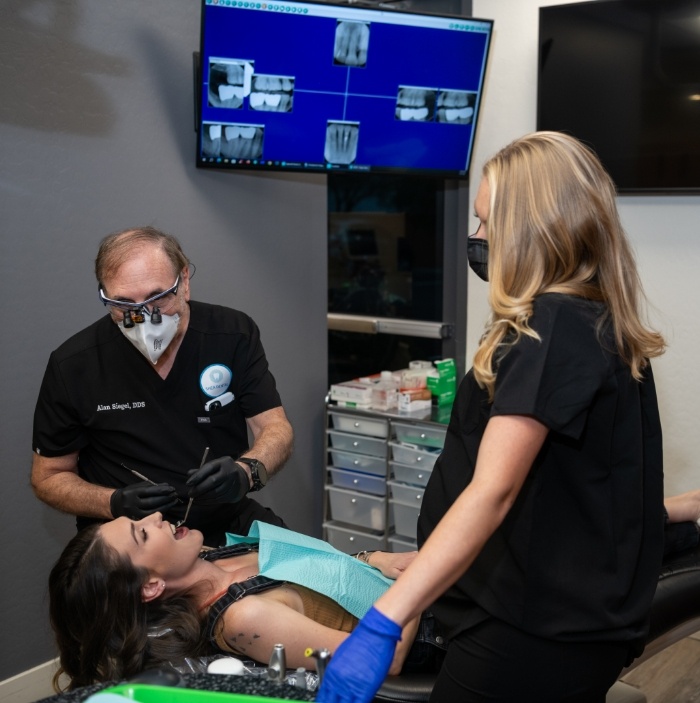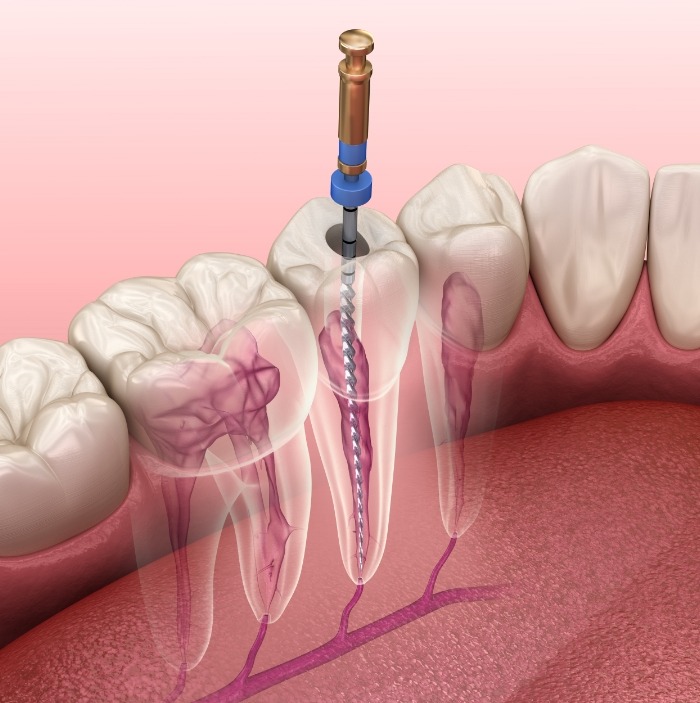Root Canal Treatment – Scottsdale, AZ
Let Us Help Save Your Smile

An infection that forms in the innermost layer of a tooth – the pulp – can cause significant pain. Without proper or timely care, it can result in tooth loss and even an abscess. Keeping your natural teeth in place is what we believe is best at Shea Dental of Scottsdale, which is why we provide root canal treatment. Treating the area and removing the affected pulp not only saves the tooth from extraction but also improves your overall health and well-being. Contact our dental office if you suspect you may be suffering from an infected tooth.
Why Choose Shea Dental of Scottsdale for Root Canal Treatment?
- The Wand™ Used for More Comfortable Delivery of Anesthesia
- Customized Dental Crowns for Post-Root Canal Placement
- Improving Smiles & Patients’ Well-Being for 30+ Years
Do I Need Root Canal Treatment?

There’s a prevailing myth that pain is the only symptom you need to keep an eye out for. That’s not the case! Here are a few additional warning signs of a severely damaged tooth:
- Red, swollen, or bleeding gums
- Dark discoloration on one tooth
- A pimple-like bump on your gums
- Persistent dental sensitivity
- A change in your bite
Of course, our dedicated dentists in Scottsdale will also closely examine your teeth and gums at your biannual visits. They will even take a look underneath the surface with X-rays, ensuring that tooth decay and other dental problems are caught as early as possible.
The Root Canal Process

A root canal requires that our team take several steps to ensure successful results. Once local anesthesia is administered with the help of The Wand™, areas of your mouth will begin to feel numb. A dental dam is then put into place to separate the tooth from the rest of the mouth. After making a small opening in the top of the crown, our dentists will begin to clear out any infected areas, remove the pulp, and clean nearby canals. Using a biocompatible solution to fill the tooth and create a tight seal, impressions will be taken for the fabrication of a custom dental crown, which will be put into place.
The Benefits of Getting a Root Canal

All too often, patients have only heard the negatives of root canal treatment, which are almost always myths. In reality, this emergency dental service offers several benefits, including a high success rate, a pain-free procedure, and long-lasting results. One of the most noteworthy benefits, of course, is that root canal treatment can save your tooth from needing to be extracted, which benefits the look, health, and function of your smile.
If you have any questions about root canal treatment – from what to expect in the treatment chair to what you need to do to heal properly – don’t hesitate to get in touch with us.
Understanding the Cost of Root Canals

Patients tend to be a little intimidated by the process of root canals, and even more so when it comes to paying for the treatment. We fully understand that, which is why we work incredibly hard to make the financial components of your dental care as easy as every other part of the treatment.
We’ll be able to give you a sense of what your root canal is going to cost when we meet you in person, but here’s what you should know before then about the factors that can influence the cost of your root canal treatment.
Factors That Can Affect Root Canal Cost

Part of the reason that it can be difficult to tell you what your root canal is going to cost without meeting you in person is that there are several factors that can influence the price of the treatment in one way or another.
For one, some teeth have more roots than others; molars have three, bicuspids have two, and incisors have only one. This means that molars are the most complicated, and most expensive, to treat.
There are also other factors that can make the procedure more complicated, like the number of teeth that are infected and the severity of the problem. In some circumstances, an external specialist may need to be brought in to deal with especially difficult issues. Such specialists will have their own rates for dental care.
It’s then important to think about how you’re going to top off the root canaled tooth. This is typically done with a dental crown, the price of which will be incorporated into the treatment.
Is it Cheaper to Pull My Tooth?

When confronted with the cost of a root canal, patients often wonder whether tooth extraction is the cheaper alternative. If you’re only looking at the upfront cost of the treatment, it may seem like this is the case.
However, tooth extractions incur another cost that root canals do not—tooth replacement. Leaving a gap in your smile after a tooth extraction isn’t necessarily feasible, as this will only lead the surrounding teeth to move out of position. For that reason, it’s necessary to use a dental bridge, dental crown, or potentially a dental implant.
That being the case, a root canal is typically the much less expensive option when you think about all of the factors associated with the treatment.
Does Dental Insurance Cover Root Canals?

Root canals are important medical procedures done to resolve serious issues with the tooth. This generally means that dental insurance is more than willing to pay for a portion of the treatment.
This will generally be around 50-80% of the total cost of your dental care, though this will depend on the details of your plan.
Other Options for Making Root Canal Treatment Affordable

Even if you’re uninsured, we don’t want you to have to go without necessary dental care. For that reason, why try to make the services you receive from us more affordable.
For one, we have an in-house savings plan that can offer heavy discounts on the care that you receive from us. We also frequently work with CareCredit, which can help you divide the cost of your services across several appointments. If you’re curious, give us a call and we’ll be happy to discuss your financial options.
Root Canal FAQs
How Much Pain is Normal After a Root Canal?
The root canal procedure itself should be completely painless, but it is unfortunately common for people to be a little bit sore in the days after the procedure. This should be fairly mild and can be handled easily with over-the-counter pain relievers.
However, you might still want to do what you can to not make the situation worse, refraining from eating anything excessively hard or that could irritate your mouth.
How Long Does a Root Canal Take?
Root canals can typically be completed within a single appointment, though especially complex procedures might need to be completed across two. In the latter case, the first appointment will entail applying an antibacterial solution to the teeth, while the second will involve actually removing the root pulp from the tooth.
The length of the treatment itself will be anywhere from 30 to 90 minutes, depending on where your tooth is located in the mouth and what kind of tooth is being treated.
Do I Need Antibiotics Before or After My Root Canal?
Antibiotics are really only necessary in circumstances where there’s a significant risk of developing an infection after the procedure, like if the patient is immunocompromised. However, this is atypical. In most circumstances, patients will not need to take antibiotics before or after your root canal treatment.
However, just to be sure, we will make it a point to take your entire medical history before performing any kind of root canal treatment.
Do Root Canals Ever Have to Be Redone?
Root canal treatment has an incredibly high success rate, with most patients being able to go their entire lives with a healthy tooth afterward. However, there are some rare circumstances where a root canal could need to be redone.
This can happen if there’s a problem with the procedure itself, like if saliva contaminated the tooth during the root canal. Retreatment may also be necessary if a new problem arises after your root canal, like if you develop new decay or another infection.
 (480) 998-3923
(480) 998-3923